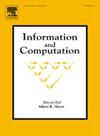On algorithms based on finitely many homomorphism counts
IF 1
4区 计算机科学
Q3 COMPUTER SCIENCE, THEORY & METHODS
引用次数: 0
Abstract
It is a well-known result of Lovász that up to isomorphism a graph G is determined by the homomorphism counts , i.e., the number of homomorphisms from F to G, where F ranges over all graphs. Thus, in principle, we can answer any query concerning G with only accessing the 's instead of G itself. In this paper, we deal with queries φ for which there is a hom algorithm, i.e., there are finitely many graphs such that for any graph G whether it is a Yes-instance of the query is already determined by the vector where the graphs only depend on φ.
We observe that planarity of graphs and 3-colorability of graphs, properties expressible in monadic second-order logic, have no hom algorithm. We provide a characterization of the prefix classes of first-order logic with the property that each query definable by a sentence of the prefix class has a hom algorithm.
For adaptive query algorithms, i.e., algorithms that again access but here might depend on , we show that three homomorphism counts are both sufficient and in general necessary to determine the isomorphism type of G.
基于有限多同态计数的算法
这是Lovász的一个众所周知的结果,在同构之前,图G是由同态计数homm (F,G)决定的,即从F到G的同态数,其中F的范围在所有图上。因此,原则上,我们可以回答任何关于G的查询,只需访问home(⋅,G),而不访问G本身。在本文中,我们处理了φ存在一个homm算法的查询,即有有限多个图F1,…,Fk,使得对于任意图G,它是否是查询的yes实例已经由向量→F1,…,Fk(G):=(homm (F1,G),…,homm (Fk,G))决定,其中图F1,…,Fk只依赖于φ。我们观察到图的平面性和图的3色性,这些性质在一元二阶逻辑中是可表示的,没有合适的算法。我们给出了一阶逻辑的前缀类的一个表征,其性质是每个可由前缀类的一个句子定义的查询都有一个homm算法。对于自适应查询算法,即再次访问hom→F1,…,Fk(G)的算法,但这里的Fi+1可能依赖于hom(F1,G),…,hom(Fi,G),我们证明了三个同态计数hom(⋅,G)对于确定G的同态类型是充分的,并且通常是必要的。
本文章由计算机程序翻译,如有差异,请以英文原文为准。
求助全文
约1分钟内获得全文
求助全文
来源期刊

Information and Computation
工程技术-计算机:理论方法
CiteScore
2.30
自引率
0.00%
发文量
119
审稿时长
140 days
期刊介绍:
Information and Computation welcomes original papers in all areas of theoretical computer science and computational applications of information theory. Survey articles of exceptional quality will also be considered. Particularly welcome are papers contributing new results in active theoretical areas such as
-Biological computation and computational biology-
Computational complexity-
Computer theorem-proving-
Concurrency and distributed process theory-
Cryptographic theory-
Data base theory-
Decision problems in logic-
Design and analysis of algorithms-
Discrete optimization and mathematical programming-
Inductive inference and learning theory-
Logic & constraint programming-
Program verification & model checking-
Probabilistic & Quantum computation-
Semantics of programming languages-
Symbolic computation, lambda calculus, and rewriting systems-
Types and typechecking
 求助内容:
求助内容: 应助结果提醒方式:
应助结果提醒方式:


